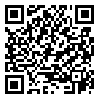BibTeX | RIS | EndNote | Medlars | ProCite | Reference Manager | RefWorks
Send citation to:
URL: http://journal.itrc.ac.ir/article-1-205-en.html
Energy detection has been adopted as an alternative spectrum sensing method for cognitive radios due to its low computational complexity and not requiring a priori information about the signal to be detected. However, noise uncertainty and hidden terminal problem make energy detector practically challenging specially in low signal-to noise ratio (SNR) regime. Collaboration among multiple cognitive radios has been recognized as a practical strategy to improve the reliability of spectrum sensing. In this paper, a cooperative spectrum sensing framework is proposed to blindly determine the occupancy of a wideband spectrum. Specifically, contrary to conventional energy detector, the proposed method does not require any knowledge of noise variance to detect the presence of primary signals. Moreover, diversity achieved by cooperation enables the framework to maintain a reasonable performance even in low SNR values. Simulation results confirm the effectiveness of our proposed method in improving both the probabilities of detection and false alarm.
| Rights and permissions | |
 | This work is licensed under a Creative Commons Attribution-NonCommercial 4.0 International License. |




